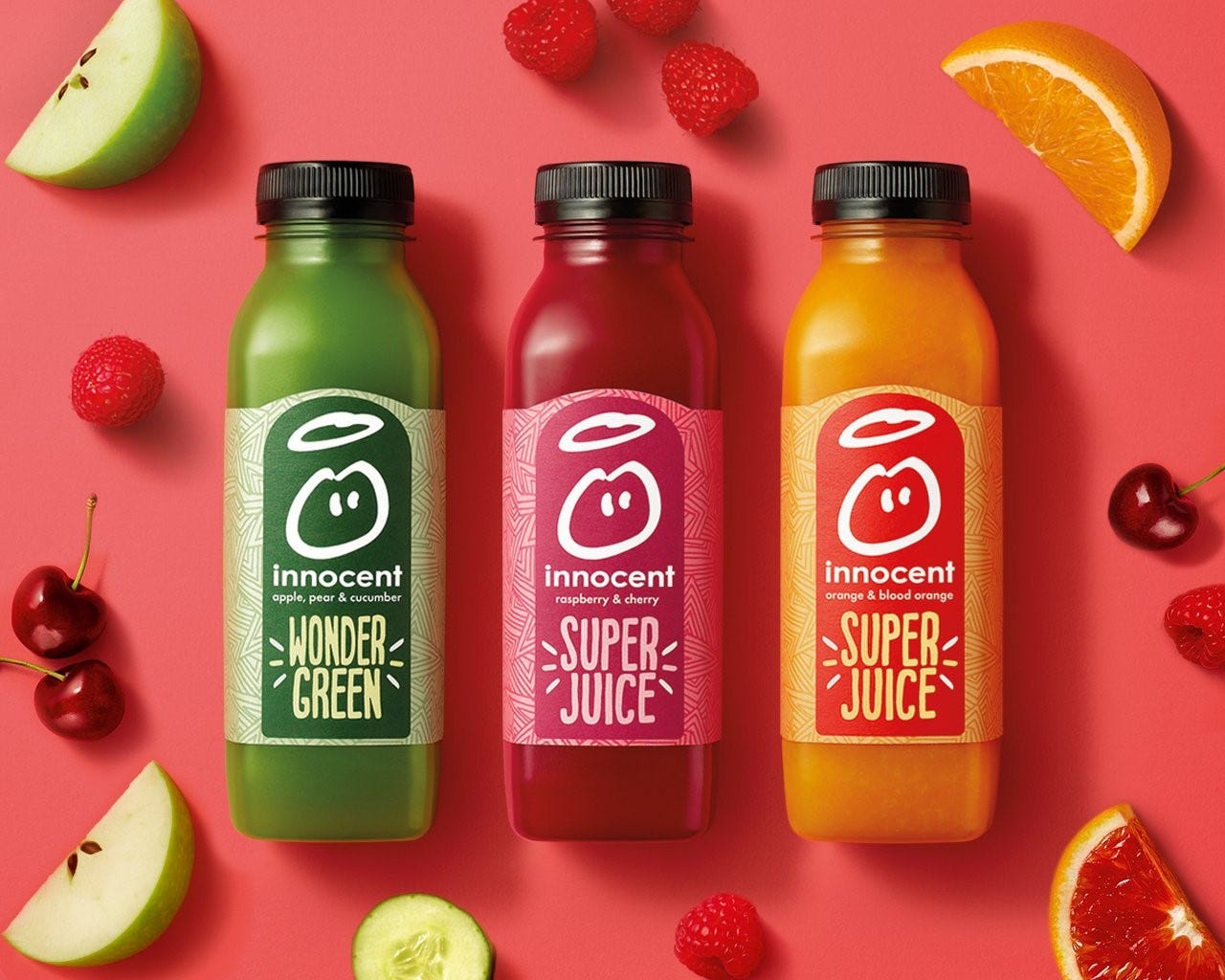🌱 International Day for Biological Diversity: 11 brands supporting biodiversity via their ingredients, and inside Innocent's 'Big Rewild'.
Featuring Innocent Drinks, Seilich, Patagonia, ZENB, Meridian and more...
Happy Monday!
Today marks International Day for Biological Diversity, so we’re covering:
Quick Take: 11 brands putting biodiversity at the heart of their products, via their ingredients.
Brand Spotlight: Inside Innocent Drinks’ ‘Big Rewild’
In case you missed it: 🌱 Having Faith in Nature: How one brand give 'Nature' a voice and a vote, and our introduction to biodiversity credits.
👉 Heading to Bread & Jams’ Future Summit tomorrow? We’d love to meet you there!
> Good News Last Week
🎯 Wiper and True announced the instalment of their on-site carbon dioxide (CO2) recovery system which captures CO2 released during fermentation. The system captures up to 70 tonnes of CO2/year before scrubbing and liquifying it to be used in packaging or carbonation.
🎯 Dock & Bay announced they’re B Corp UK certified. Their next goal is to make their production line carbon neutral by the end of 2024.
⭐️ Ecover launched their limited edition Too Good To Waste products, including a multi-surface cleaner and toilet cleaner, produced using food waste. Alongside these new products, they also launched their washing-up liquid produced with waste products from the beer brewing process.
⭐️ Lush announced the completion of their recycling centre, which is already handling over 80% of its UK manufacturing waste. The new facility, three times larger than the previous one, can process 500 tonnes of wastewater and 20 tonnes of plastic per week, while also focusing on repairing and reusing items.
⭐️ Plenty opened their new indoor vertical farm in Compton, California. The farm can yield 4.5 million pounds of leafy greens annually, which is approximately 350 times more than what a traditional farm can achieve on the same land area.
⭐️ Gucci removed "entirely carbon neutral" messaging from their website, coinciding with the UK's Advertising Standards Authority (ASA) decision to ban carbon neutrality claims without proof of authentic and additional offsets.
⚡ The European Parliament passed a directive to empower consumers in making green choices. The directive combats greenwashing, prohibits misleading environmental claims, promotes product durability, and introduces a guarantee label. Negotiations with EU member states will begin shortly to finalise the law.
> Click on each link to read more.
> Quick Take
11 brands putting biodiversity at the heart of their products, via their ingredients.
Today marks the International Day for Biological Diversity. The term biodiversity refers to all the different kinds of life you’ll find in one area - including animals, plants, fungi and even microorganisms like bacteria that make up the natural world. It is essential for maintaining the balance of ecosystems and ensuring the survival of various species, and also plays a crucial role in providing us with a variety of resources, including food, medicine, and raw materials for various industries. Unfortunately, our global biodiversity is under threat due to various factors such as habitat loss, pollution and overexploitation of resources.
This year there has been growing momentum around biodiversity:
WWF published ‘The Living Planet report 2022’ which found that an average of 69% decline in global populations of mammals, fish, birds, reptiles, and amphibians since 1970.
The UK’s three leading conservation charities (WWF, RSPB and the National Trust) came together to convene and fund the creation of the People's Plan for Nature. By incorporating feedback from UK citizens this plan sets out the public’s vision for the future of nature in the UK and the actions we need to take to protect it.
Sir David Attenborough returned to TV screens for a landmark series, Wild Isles, celebrating the wonders of British and Irish wildlife.

Overexploitation of resources is not only about how much you are taking from nature, it’s also about our dependence on a single species. For example - about 75% of the world’s food comes from 12 plants; however, there are over 30,000 edible plants in existence today. Reliance on these 12 plants drives the use of pesticides, fertilisers and damaging farming techniques to cope with this demand, which then have an adverse impact on the nearby flora and fauna.
In light of the biodiversity day, let’s take a look at 11 brands across fashion, beauty and food that are supporting biodiversity:
Fashion sector: Regenerative Cotton
Solution: Regenerative organic cotton farming practices involve crop rotation, cover cropping, and reduced tillage, which not only help in fighting climate change by storing carbon in soils (as ‘carbon sinks’) but also support the growth of diverse plant and animal species.
Brands leading the way: Patagonia, has been doing this since 2018 and are now working with over 2,200 farmers. Solai is also another brand that committed to use regenerative farming with farmers in Erode, Tamil Nadu. Bedstraw+Madder also implements regenerative cotton, which you can read more in our newsletter here.
Beauty sector: Using more sustainable oil alternatives
Solution: Oils are heavily used in beauty products because of its moisturising feature. Diversifying the use of vegetable oil helps to hasten the process of biodiversity loss! There are numerous vegetable oils that can be used in different products, and of course, having their unique additional benefits. Avocado oil and almond oil are some of the alternatives.
Brands leading the way: Beauty Kitchen is swapping Argan oil for Abyssinian oil, which is gaining popularity as a sustainable alternative to Argan oil. It is a more sustainable option as the Crambe abyssinica plant can be cultivated in various regions, unlike Argan trees, which are native to a specific area in Morocco and are under threat due to over-harvesting. Read our previous brand spotlight on them here. Seilich is using various different oil alternatives that are sustainably grown in the UK, such as Lunaria annua (honesty) seed oil and Rubus idaeus (raspberry) seed oil.
Food sector: Alternative ingredients in our foods
Solution: Palm oil is a widely used ingredient in the food industry, but its production has been linked to deforestation and the decline of endangered species. Oil alternatives such as sunflower oil, rapeseed oil and coconut oil became popular as they have similar chemical composition. Diversification of grains alternatives such as millets, sorghum and quinoa, are preferable as this puts less pressure on rice and wheat, which are the global food staples.
Brands leading the way: Pip & Nut and Meridian are brands that ditch the use of palm oil in their nut spread. Candy Kittens produces their candies palm-oil free, and so does Tony Chocolonely with their chocolates. Hodmedod has a blend of diverse plants on their wholemeal flour and their quinoa are locally sourced in Britain. ZENB uses yellow peas for their pasta instead of wheat, not only does it support biodiversity, it also uses less water and fertiliser to grow.
It has become increasingly important for businesses, especially in the FMCG sector, to opt for diverse ingredients and materials in their products. This not only helps promote biodiversity today, but also ensures better and more holistic environmental stewardship in the long-term.
> Brand Spotlight
Inside Innocent Drinks’ ‘Big Rewild’
The theme for this year’s International Day for Biological Diversity is “From Agreement to Action: Build Back biodiversity”. Therefore, we thought it would be fitting to focus on a brand that is already taking action to build back biodiversity: Innocent Drinks.
The drinks company, which started in 1999, has recently published their 2022 ‘Good All Round report’ (their annual impact report), is a proud B Corp and committed to their purpose: ‘to make natural, tasty drinks that help people do themselves some good and leave the planet better than we found it.’ Innocent sells their drinks in 18 countries and has over 800 employees working in 14 different locations across Europe and Asia. Their strategy is split into three pillars: healthier people, healthier communities and healthier planet. Their work on biodiversity falls under their healthier planet pillar, and they’re making great progress.
How is Innocent doing its bit for biodiversity?
In April 2022 they launched the ‘Big Rewild’, to get people rewilding nature all over Europe. Rewilding means giving places back to nature by planting, growing and looking after the land. Together with 11 NGOs and local organisations they are aiming to protect and restore two million hectares of land by 2025. That’s about the size of Wales.
What have they done so far in 2022?
In the UK they teamed up with The Orchard Project to turn Trafalgar Square green by bringing more than 6000 plants, flowers and trees to the city.
In France they worked with MiiMOSA, a crowdfunding platform dedicated to agricultural and food transition. They supported them on six rewilding projects, planting over 10,000 trees.
In Ireland they partnered with Grown Forest to plant 10,000 native trees across the country.
In Belgium and the Netherlands they partnered with two charities, Trees for All and VZW Bollebos to plant over 2000 trees.
In Germany they have planted the innocent Hodlwood, a 10,000 square metre wide meadow filled with lots of varieties of fruit trees. They are covering the cost of protecting and caring for it for four years.
Innocent has gone big for biodiversity and we can’t wait to see how they get on with all their projects. Bring on the 2023 Good All Round report! For ideas on how your business can get involved with biodiversity why not give The Business of Nature film a watch - 30 minutes you will not regret.
Take a closer look at Innocent Drinks:

> In case you missed it
🌱 Having Faith in Nature: How one brand gave 'Nature' a voice and a vote, and our introduction to biodiversity credits.
Featuring Sapling Spirits, Abel & Cole, PANGAIA and more...
> Follow up with…
Article: Inside the little-known group setting the corporate climate agenda
Report: The future of food and agriculture: Trends and challenges
Event: Aligning Business Growth and Sustainability: challenges and opportunities in the food industry - 31st May
Summit: Bread & Jams’ Future Summit - 23rd May - 30% off with ‘FOLLOWING30’ at checkout!



